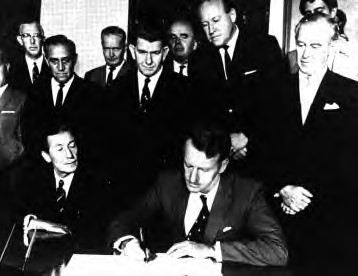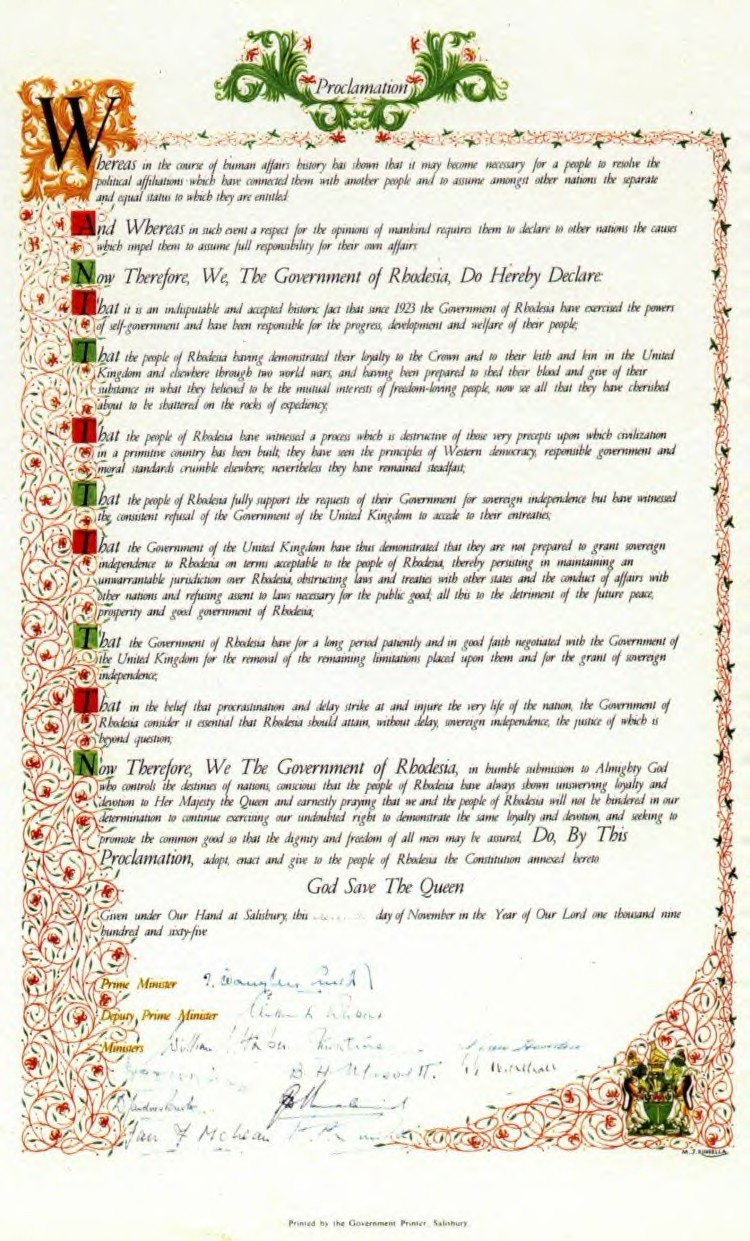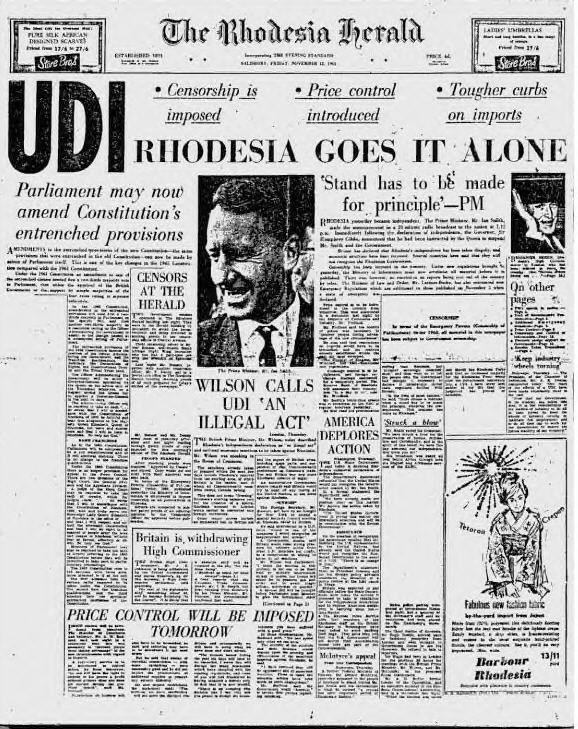UDI
UDI |
UDI - the Unilateral Declaration of Independence, was declared by Prime Minister Ian Smith on 11th November 1965 and marked the begining of the end of Rhodesia. The road to UDI was a long and winding one, with many a reason behind the decision of the Smith legislation to become indipendent from British rule. (see the HISTORY section) It was also a road that led the people of Rhodesia into one-way traffic, with no option but to stand alone against Britain, the Commonwealth, the UN and, at the end, against the liberation movement of ZANLA and ZANU/PF |
It was obvious that Britain would sacrifice Rhodesia to the cause of a post-imperialistic world order and that white supremacy in Africa was under pressure from all sides. This resulting in the apartheid regime of South Africa being the only ally in Rhodesia´s struggle to survive as a country. |
|
|
Announcement of Unilateral Declaration of Independence, 11th November 1965 |
Now I would like to say a few words to you. Today, now that the final stalemate in negotiations has become evident, the end of the road has been reached.
It has become abundantly clear that it is the policy of the British Government to play us along with no real intention of arriving at a solution which we could possibly accept. Indeed, in the latest verbal and confidential
message delivered to me last night we find that on the main principle which is in dispute the two Governments have moved further apart. I promised the people of this country that I would continue to negotiate to the bitter
end and that I would leave no stone unturned in my endeavours to secure an honourable and mutually accepted settlement. It now falls to me to tell you that negotiations have come to an end. No one could deny that we have
striven with might and main and at times bent over backwards to bridge the gap which divides us from the British Government. . . . Let no one believe that this action today marks a radical departure from the principles by
which we have lived, or be under any misconception that now the Constitution will be torn up and that the protection of the rights of all peoples which are enshrined in that Constitution will be abrogated and disregarded.
Neither let it be thought that this event marks a diminution in the opportunities which our African people have to advance and prosper in Rhodesia. Far from this being the case, it is our intention, in consultation with the
chiefs, to bring them into the Government and administration as the acknowledged leaders of the African people on a basis acceptable to them. It is our firm intention to abide by the Constitution. Indeed, we have never asked
for anything other than independence on the basis of the present Constitution, and only such amendments are included as are necessary to adapt it to that of an independent country. With regard to the position of Members of
Parliament, judges, civil servants, and members of the armed forces, as well as the police, provision has been made for all of them to carry on their duties, and all are deemed to have complied with the requirements of the New
Constitution. They. will continue to carry on their normal work. All present laws shall continue to operate and the courts will enforce them in the normal manner, We are doing no more than assuming the right which various
British Ministers have in the past indicated were ours. And in fact this Constitution was the one which would carry us to independence. Let no one be persuaded that this action marks a change in our attitude towards our
neighbours in Africa, to whom we have ceaselessly, extended the hand of friendship and to whom we have nothing but goodwill and the best of intentions. We have never sought, nor will we ever seek, to interfere or in any way
attempt to influence their policy and their internal affairs. All we ask in return is their goodwill in permitting us to look after what are, after all, our own private and domestic matters. . . . There can be no solution to
our racial problems while African nationalists believe that, provided they stirred up sufficient trouble, they will be able to blackmail the British Government into bringing about a miracle on their behalf by handing the
country. over to irresponsible rule. There earl be no happiness in this country, while the absurd situation continues to exist where people such as ourselves, who have ruled ourselves with an impressive record for over 40
years, are denied what is freely granted to other countries, who have ruled themselves in some cases for no longer than a year. There can never be long-term prosperity, which is so necessary for the nurturing of our
endeavours to improve the standard of living and increase the happiness and better the lot of all our people, whilst the present uncertainty exists. No businessman could ever seriously contemplate massive long-term investment
in a country in which chaos and confusion will always be future possibilities. Whatever the short-term economic disadvantages may be, in the long term steady economic progress could never be achieved unless we are masters in
our own house.... That some economic retributions will be visited upon us there is no doubt. Those who seek to damage us do not have any great concern for the principles to which they endlessly pay lip service; for if they
really believed in these principles, which they ceaselessly proclaim, then they could not possibly deny, the many. disasters which have been brought about by the premature withdrawal of European influence from countries in
Africa and Asia who where nowhere near ready for it. There is no doubt that the talk of threats and sanctions is no more than appeasement to the United Nations, the Afro-Asian bloc, and certain members of the Commonwealth;
and undoubtedly some action will be taken. But I cannot conceive of a rational world uniting in an endeavour to destroy the economy of this country, knowing, as they undoubtedly do, that in many cases the hardest hit will be
the very people on whose behalf they would like to believe they- are invoking these sanctions. We for our part will never do anything in the nature of taking revenge on any neighbouring African State for what other countries
may, do to us. . . . We may be a small country, but we are a determined people who have been called upon to play a rôle of world-wide significance. We Rhodesians have rejected the doctrinaire philosophy of
appeasement and surrender. The decision which we have taken today is a refusal by Rhodesians to sell their birthright. And, even if we were to surrender, does anyone believe that Rhodesia would be the last target of the
Communists in the Afro-Asian block? We have struck a blow for the preservation of justice, civilization, and Christianity; and in the spirit of this belief we have this day assumed our sovereign independence. God bless you
all. Source: from the East Africa and Rhodesia Newspaper, November 18, 1965, pp. 204-205. |
 |
|||||
Prime Minister Ian Smith signing the UDI |
|||||
 |
|||||
 |
Unilateral Declaration of Independence Whereas in the course of human affairs history has shown that it may become necessary for a people to resolve the political affiliations which have connected them with another people and to
assume amongst other nations the separate and equal status to which they are entitled: And whereas in such event a respect for the opinions of mankind requires them to declare to other nations the causes which impel
them to assume full responsibility for their own affairs: Now therefore, we, the Government of Rhodesia, do hereby declare: That it is an indisputable and accepted historic fact that since 1923 the
Government of Rhodesia have exercised the powers of self-government and have been responsible for the progress, development and welfare of their people; That the people of Rhodesia having demonstrated their loyalty to
the Crown and to their kith and kin in the United Kingdom and elsewhere through two world wars, and having been prepared to shed their blood and give of their substance in what they believed to be the mutual interests of
freedom-loving people, now see all that they have cherished about to be shattered on the rocks of expediency; That the people of Rhodesia have witnessed a process which is destructive of those very precepts upon which
civilization in a primitive country has been built, they have seen the principles of Western democracy, responsible government and moral standards crumble elsewhere, nevertheless they have remained steadfast; That the
people of Rhodesia fully support the requests of their government for sovereign independence but have witnessed the consistent refusal of the Government of the United Kingdom to accede to their entreaties; That the
government of the United Kingdom have thus demonstrated that they are not prepared to grant sovereign independence to Rhodesia on terms acceptable to the people of Rhodesia, thereby persisting in maintaining an unwarrantable
jurisdiction over Rhodesia, obstructing laws and treaties with other states and the conduct of affairs with other nations and refusing assent to laws necessary for the public good, all this to the detriment of the future peace,
prosperity and good government of Rhodesia; That the Government of Rhodesia have for a long period patiently and in good faith negotiated with the Government of the United Kingdom for the removal of the remaining
limitations placed upon them and for the grant of sovereign independence; That in the belief that procrastination and delay strike at and injure the very life of the nation, the Government of Rhodesia consider it
essential that Rhodesia should attain, without delay, sovereign independence, the justice of which is beyond question; Now therefore, we the Government of Rhodesia, in humble submission to Almighty God who controls the
destinies of nations, conscious that the people of Rhodesia have always shown unswerving loyalty and devotion to Her Majesty the Queen and earnestly praying that we and the people of Rhodesia will not be hindered in our
determination to continue exercising our undoubted right to demonstrate the same loyalty and devotion, and seeking to promote the common good so that the dignity and freedom of all men may be assured, do, by this proclamation,
adopt enact and give to the people of Rhodesia the constitution annexed hereto; God Save The Queen Given under Our Hand at Salisbury this eleventh day of November in the Year of Our Lord one thousand
nine hundred and sixty five. THE GOVERNMENT OF RHODESIA |
|||||||||||||
 |
|||||||||||||
 |
|||||||||||||
|
Prime Minister Harold Wilson: The Position of the British Government on the Unilateral Declaration of Independenec by Rhodesia, Speech to Parliament, November 11,1965 |
|||||||||||||
|
I still find it incredible-and the House, when it reads the records, will find it incredible-that this action should have taken place this morning. But, as I have previously warned the House, the differences between us have not been differences of legal drafting; they have not been the differences of normal political interchange. They have represented a deep difference of philosophy-a gulf that we now know could never be bridged because it was a gulf covering all the differences between different worlds and different centuries. At every point when agreement was near we were told that our positions were irreconcilable. This was because there were men in the then Rhodesian Cabinet who were determined at all costs that agreement should not be reached. I challenged Mr. Smith today, as I did-and my right hon. Friends will confirm this-in my last meeting in Salisbury, with this fact, and to his credit Mr. Smith had the honesty to admit it in my telephone conversation this morning. . . . Now I must inform the House of the action that has been taken, the action that is being taken, and that will be taken-some of it subject to the necessary powers being given by Parliament to the Government. I repeat that the British Government condemn the purported declaration of Independence by the former Government of Rhodesia as an illegal act and one which is ineffective in law. It is an act of rebellion against the Crown and against the Constitution as by law established, and actions taken to give effect to it will be treasonable. The Governor, in pursuance of the authority vested in him by Her Majesty The Queen, has today informed the Prime Minister and other Ministers of the Rhodesian Government that they cease to hold office. They are now private persons and can exercise no legal authority in Rhodesia. The British Government wish to make it clear that it is the duty of all British subjects in Rhodesia, including all citizens of Rhodesia, to remain loyal to The Queen and to the law of the land, and to recognise the continuing authority and responsibility for Rhodesia of the Government of the United Kingdom. The British Government are in close touch with all other Commonwealth Governments about the consequences of this illegal act and about the measures we should take. The British Government will, of course, have no dealings with the rebel régime. The British High Commissioner is being withdrawn and the Southern Rhodesian High Commissioner in London has been asked to leave. Export of arms, including spares have, of course, been stopped. All British aid will cease. Rhodesia has been removed from the sterling area. Special exchange control restrictions will be applied. Exports of United Kingdom capital to Rhodesia will not be allowed. Rhodesia will no longer be allowed access to the London capital market. Our Export Credits Guarantee Department will give no further cover for exports to Rhodesia. The Ottawa Agreement of 1932 which governs our trading relations with Rhodesia is suspended. Rhodesia will be suspended forthwith from the Commonwealth Preference Area and her goods will no longer receive preferential treatment on entering the United Kingdom. There will be a ban on further purchases of tobacco from Southern Rhodesia. We propose to suspend the Commonwealth Sugar Agreement in its relation to Rhodesia and to ban further purchases of Rhodesian sugar. We shall not recognise passports issued or renewed by the illegal Southern Rhodesian regime. . . . It is the duty of everyone owing allegiance to the Crown in Rhodesia or elsewhere to refrain from all acts which would assist the illegal régime to continue in their rebellion against the Crown. Members of the armed forces and the police in Southern Rhodesia should refrain from taking up arms in support of the illegal régime, and from doing anything which will help them to pursue their unlawful courses. Public servants in Rhodesia should not do any work for the illegal régime which would tend to further the success of the rebellion. It is the duty of all private citizens owing allegiance to the Crown, wherever they, may be, in Rhodesia or outside, to refrain from acts which will give support to the illegal regime. . . . But I cannot end this statement about a problem with which my right hon. Friend the Secretary of State and other colleagues and my-self have been so intimately concerned for so long without expressing the deep sense of tragedy which each of us feels-personal tragedy, but not only, personal tragedy'. It is a tragedy affecting a great people, including many. thousands who have made their homes there and who are plunged into a maelstrom not of their own making, and of millions more who are denied the inalienable human right of self-expression and self-determination. Heaven knows what crimes will be committed against the concept of the rule of law and of human freedom for which this House has always stood: this progressive unfolding of the regulations which have been signed under the state of emergency-and there arc more to come-are an ominous warning. The illegal regime which now claims power and authority in Rhodesia marked its usurpation of authority- with a proclamation which borrowed for the purposes of small and frightened men the words of one of the historic documents of human freedom, even to the point of appropriating the historic reference to "a respect for the opinions of mankind." I would repeat to them and to the Rhodesian people as a whole the words I used in my farewell statement on leaving Salisbury, which also quoted these words: When, nearly two centuries ago, the American States declared their independence from a British Government, which, to say the least, was remote, oppressive and unimaginative, they insisted that their actions be inspired by "a proper respect for the opinions of mankind." Nor were they alone in the world. Could anyone say that either of these things would be true of a Rhodesia which chose illegally to claim its independence? It would be unworthy of this Government, of any British Government, as it would be unworthy of this House, to allow this challenge, offensive as it is to
all our cherished traditions, and to the wider aspirations of the whole of mankind, to go unanswered. We did not seek this challenge. The House will concede that we did everything in our power to avoid it, but now
it has been made, then, with whatever sadness, we shall face this challenge with resolution and determination. Whatever measures the Government, with the support of this House, judge are needed to restore Rhodesia to the rule
of law, to allegiance to the Crown, these measures will be taken. And I am confident that we shall have riot only the support of this House, not only the support of the nations of the world, but we shall have the clear and
decisive verdict of history. Source: from Hansard, Parliamentary Debates, House of Commons, Official Report, 5th Series, Vol. 720 (H.M.S.O., 1966), columns 349-356. |
|||||||||||||
 |
|||||||||||||
|
Soviet Government Statement The Situation in Southern Rhodesia, November 15, 1965 |
|||||||||||||
|
The colonialists have committed a new crime against the African peoples. On November 11 the racialist régime of Ian Smith proclaimed the "independence" of Southern Rhodesia. These actions are aimed at perpetuating in Southern Rhodesia a colonial system based on inhuman oppression of the Zimbabwe people, four million strong, by a handful of racialists and on ruthless suppression of the lust struggle of this people for real independence, freedom and social justice. . . . The South Rhodesian racialists would not have dared to carry out their criminal plans without a deal with the colonialists, who have permitted the racialist régime in Salisbury to acquire economic and military strength and who have rendered it all-out support. Nor could this crime have taken place without the blessing of the governments of other N.A.T.O. countries, and in the first place the United States of America. The creation of yet another centre of racialism-this time in Southern Rhodesia-is part of the overall plan of imperialist circles to erect an obstacle in the way, of the national liberation movement of the African peoples, the waves of which are drawing nearer and nearer to the last bulwarks of colonialism. The Soviet government fully shares the view of the independent African states, expressed in decisions of the Organisation of African Unity, that the ruling circles of Britain will never be able to escape responsibility for this crime against the African peoples, for the national tragedy of the Zimbabwe people, who for many, years now have been waging a stubborn struggle for their rights. At the present time the government of Great Britain, in words, is condemning the actions of the South Rhodesian authorities and is asking the Security Council to examine the question of Southern Rhodesia. It is clear, however, that these statements of the British government are at present only an attempt to whitewash its actual policy. As long ago as 1961, having put into effect a "constitution" worked out by- the British government itself which formalised the racialist system, Britain laid the foundations for the present régime of the racialists' colonial rule over millions of Africans. Following that, she armed the South Rhodesian racialists and helped them to consolidate their positions by encouraging the colonial alliance of Southern Rhodesia with the racialist régime in the Republic of South Africa and the Portuguese colonialists in Angola and Mozambique. As a result, Southern Rhodesia turned into a police state, into a land of jails, concentration camps and terror for the African population of the country. The racialist régime in Southern Rhodesia also constitutes a hotbed of danger for all other African peoples, including those which have already freed themselves from colonial oppression. It is a bayonet pointed at the heart of liberated Africa, a constant threat to peace on the African continent and a threat to world peace. The Soviet government, guided by its principled stand in questions of abolishing colonialism, strongly condemns the new crime against the peoples of Africa and declares that it does not recognise the racialist regime which has usurped power in Southern Rhodesia. The Soviet Union fully supports the decisions adopted by the United Nations Security Council and General Assembly on the situation in Southern Rhodesia and will carry them out unswervingly. Loyal to its steadfast policy of supporting the national liberation movement of the peoples, the Soviet government declares its full solidarity with the Zimbabwe people and again confirms its readiness to co-operate with the African countries in rendering them all-out support in their just struggle for genuine national independence. Source: from the Soviet Neivs, No. 5206 (November 16, 1965), p. 70. |
 |
|
|
|
|
|
|